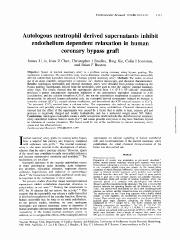Please use this identifier to cite or link to this item:
https://ahro.austin.org.au/austinjspui/handle/1/13184| Title: | Autologous neutrophil derived supernatants inhibit endothelium dependent relaxation in human coronary bypass graft. | Austin Authors: | Liu, J J;Chen, J R;Bradley, C J;Xie, B;Johnston, Colin I;Buxton, Brian F | Affiliation: | Department of Cardiac Surgery, University of Melbourne Austin Hospital, Heidelberg, Victoria, Australia | Issue Date: | 1-Sep-1994 | Publication information: | Cardiovascular Research; 28(9): 1353-9 | Abstract: | Spasm of internal mammary artery is a problem during coronary artery bypass grafting. The mechanism is unknown. The aim of this study was to determine whether supernatants derived from neutrophils affected endothelium dependent relaxation of human internal mammary artery.The studies involved use of an organ chamber, measurement of cytosolic Ca2+, electron microscopy, and chemical characterisation.Autologous neutrophils and internal mammary artery were obtained from patients undergoing the bypass grafting. Supernatants derived from the neutrophils were used to treat the patients' internal mammary artery rings. The results showed that the supernatants derived from 1 x 10(3)-5 x 10(6) cells.ml-1 neutrophils produced a potent concentration dependent inhibition of the endothelium dependent relaxation to ATP, acetylcholine, and the calcium ionophore A23187, but not the endothelium independent relaxation to sodium nitroprusside. In cultured human endothelial cells, the neutrophil derived supernatants induced an increase in cytosolic calcium ([Ca2+]i), caused calcium oscillations, and desensitised the ATP induced increase in [Ca2+]i. The increased [Ca2+]i resulted from a calcium influx. The supernatants also induced an increase in vesicle formation and possibly exocytosis in the internal mammary artery endothelium. Chemical characterisation showed that the effect of the supernatants was caused by a factor that is stable to heat, extreme pH and protease, is negatively charged and weakly hydrophobic, and has a molecular weight under 500 Dalton.Autologous neutrophils release a stable non-protein small molecule that disturbs internal mammary artery endothelial function. Since it raises [Ca2+]i and causes possible exocytosis, it may have functions beyond its inhibition of vascular relaxation. This factor could be one of the contributors to internal mammary artery spasm and late atherosclerosis. | Gov't Doc #: | 7954645 | URI: | https://ahro.austin.org.au/austinjspui/handle/1/13184 | Journal: | Cardiovascular research | URL: | https://pubmed.ncbi.nlm.nih.gov/7954645 | Type: | Journal Article | Subjects: | Acetylcholine.pharmacology Adenosine Triphosphate.pharmacology Biological Factors.isolation & purification.pharmacology.secretion Calcimycin.pharmacology Calcium.metabolism Cells, Cultured Coronary Artery Bypass Cytosol.drug effects.metabolism Dose-Response Relationship, Drug Endothelium, Vascular.cytology.drug effects Exocytosis.drug effects Humans In Vitro Techniques Mammary Arteries.drug effects Neutrophils.secretion Nitroprusside.pharmacology |
| Appears in Collections: | Journal articles |
Files in This Item:
| File | Description | Size | Format | |
|---|---|---|---|---|
| 7954645.pdf | 1.11 MB | Adobe PDF |  View/Open |
Page view(s)
24
checked on Dec 27, 2024
Download(s)
132
checked on Dec 27, 2024
Google ScholarTM
Check
Items in AHRO are protected by copyright, with all rights reserved, unless otherwise indicated.
